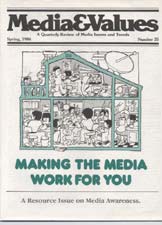Television Exerts Powerful Draw
|
This article originally appeared in Issue# 35
|
By Dave Gibson
Television exerts a powerful draw on people. I've seen adults drawn into fast action in the after dinner kitchen cleanup department and I've seen children drawn to complete homework early — all for the sake of spending Thursday evening with Bill Cosby's television family.
Sometimes television draws the human eye like a magnet — an irresistible light in the corner of the room. Of course, with the light comes the sound. It may be the sound of beautiful music or of words to challenge our powers of reflection. Or it may be a din. My garrulous three-year-old gave us more food for thought than she intended when she announced recently; "The TV is so loud I can hardly hear myself talk!"
The sound and light of television combine to create a multifaceted attraction, one people turn to for entertainment and relaxation, for escape, for news or for a taste of another kind of life.
A recent study found evidence that some members of our mobile society - living far from close relatives they might once have consulted - turn to the characters in TV shows for information on what constitutes a good marriage, judging their own success against the images projected on their living room screen.
I believe that some people who spend much time alone turn to the television almost as if it were a friend. They rely on the companionship television provides.
Few people would deny that television represents a powerful attraction in society. What critics want to know is: Does television just draw on the human spirit — or sap it?
And the answer is a perfectly clear "yes and no." For television's draw is a paradoxical force.
TV programming can educate, raising important issues in ways that deepen our thinking about them. Yet, such programming can treat values so lightly as to trivialize them.
Family members watching TV together may find that a program has fostered their conversation and communication. Yet, families may experience no real sense of unity around the television set; instead, many complain, a wedge grows between them.
I have the impression that more and more people are evaluating their TV viewing in light of their other priorities. They are checking its impact on:
- their leisure, vital for both relaxation and personal development
- their need for exercise, which already encounters many obstacles
- their need for some quiet time each day
- their availability to friends and family members
And people are asking, "Am I merely a passive receiver of what television offers? To what extent are my values shaped by what I view, without much thought on my part?"
Television is an easy access medium which has made a huge impact on home life over the past 35 years. It is a real attraction — one with the power to enhance life or detract from it.
Condensed and reprinted with permission from an article that originally appeared in Faith Today, a publication of the Catholic News Service, edited by David Gibson.



